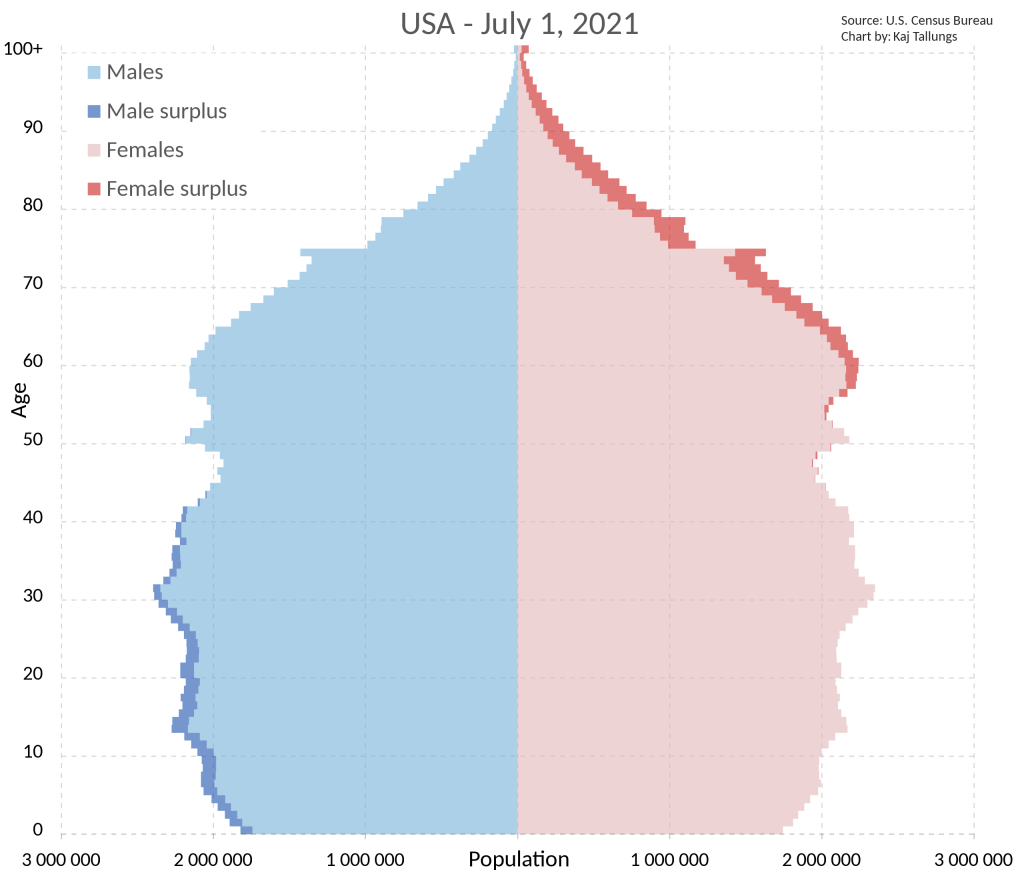Hello babies, welcome to Earth. You’ve shown up at an interesting time. Every 40 years or so, the United States demographic pyramid squeezes a bit. Some combination of cycling birth rates and global catastrophe conspire to make a dip. A trench. A crater. You’re lucky enough to be born into one. I’m very sorry.
The dip in 1900 was not immediate, but imposed as those children came of age just in time to be shipped off and killed in the first World War. The Great Depression and World War II generated a second dip through the 1940’s, made more pronounced by the huge swell of Boomers coming after.
The last crater happened around 1980 at the hinge between Generation X and Millennials. There are some interesting lessons to be learned from their experience. My experience. I was born in 1977 when the depths of the dip were really gearing up. It’s happening again in the 2020’s, and these crater kids will be graduating high school in 2040. Babies, here’s what you’re going to need to know.
Generation not enough
First, the bad news. There’s simply not enough of you to matter. There are less people in your cohort than there are in the large mass ahead of you. In 2018, there were 19 million children aged 0 to 4. This was down 5% from the 21 million kids in the 5-9 cohort just ahead of them. Four years later, there’s again 19 million 0 to 4 year olds. This may be the crater floor.
Some numbers suggest birth rates are increasing, but nothing like a post-pandemic baby boom. Many would-be parents find the world is simply too bleak. This birth rate increase would need to sustain for several years before we see an ascending curve. We may be on the crater floor for a while.
So, running 5% off the cohorts ahead of you sucks. Everyone that spends money, from government to advertisers, are going to glaze right past you as their attention focuses on the population bulge ahead of you.
This will impact schools. Districts make their projections over relatively short terms and with very tight margins. A decrease of 5% could mean 30 kids in a school, and that’s the difference in a teacher. Over a 50,000 child school district, that’s 2,500 kids, or 100 student classrooms. High schools run 2,000 kids. In the name of austerity, your population crater will be used to justify cuts.
This will impact your ability to work, make a living, and find a home. Just as with schools, programs will be cut because demand will decrease. Like community colleges and downtowns are gutted in the 1980’s. Or they’ll be cut budgets because folks in front of you used the programs a lot and you don’t have the clout to stop it from being demonized as a moral failing. Think about mental health, or public housing, or taking student loans out of bankruptcy. The rules are a moving target. And they’re moving away from you.
Your small cohort will impact everything that’s important to you. There were plenty of folks in my crater that were concerned about the environment, but we were stuck being told to recycle more and buy less hair spray. It wasn’t until Millennials started being concerned en masse that it returned to front pages. Cannabis legalization, LGBTQ+ rights, and many other “new” movements existed but couldn’t find a critical mass in the smaller cohort.
Generation not you
Now, the worse news. Crater kids are either a half a step ahead or a half a step behind. Some of this will depend on having older or younger siblings. Babysat by my older cousin, I knew Breakfast Club and Fast Times. I was told to hide my eyes behind a pillow for the sexy parts. My younger brothers kept us knee deep in Pokemon and Alf, but I wasn’t encouraged to play as I was too old to do those little kid things.
The same pulses happened in music. All of grunge was amazing and transcendent and probably a lot of it was lost on a weird 14 year old viewing it through MTV. Then you get to the point where you have some money to spend on concerts and music has shifted to Britney Spears. Suddenly, the entire HFStival lineup in Baltimore is populated with nostalgia acts. Always the trailing edge of something finished or the leading edge before something bigger.
It gets really dicey when the crater divides two sides of an ideology. Like the health and nutrition advice that was targeted towards Boomers in the 80’s but is widely discredited now. Unlike that time, we know teeth shouldn’t be brushed vigorously with the stiffest brush possible. Don’t replace fat with aspartame. Newfangled drugs like Prozac do not replace therapy. Your health will be forever changed as your parents are sold experiments on their own.
Because of the size of your cohort, the up and down of culture and ideas is a ride that you’re going to watch from the side. They’ll point the great machine of commerce and advertising at parents, miss the target and hit you. There weren’t enough of you to notice, crater kid. Sorry about that. Welcome to the splash zone for history’s log flume.
Generational pushbroom
The good news is that attention is coming. It will be late and wrong. You’ll be overlooked until pandered to, ignored until needed. And that need is one thing: your job is to clean up the mess.
A couple years back, the last demographic crater got labeled “Xennials.” It’s an obvious and terrible portmanteau, particularly for folks who watched Xenomorphs threaten Ellen Ripley at way too young an age.

All of the sudden, my micro-generation was being told that we’re necessary and resourceful. Gen X cynicism with Millennial drive! We’re a bridge between an analogue childhood and digital adulthood. We remember a time before ubiquitous devices, and are not digital natives because we received our first email address in college. Xennial got defined in terms of the original Star Wars saga, with kids born between A New Hope in 1977 and Return of the Jedi in 1983.
And that’s the problem. We were defined. Defined as a bridge with a purpose. We ease the workplace into accepting (some) Millennial values without upsetting Gen X staffers or long tenured Boomer managers. Of course, many of the values are performative. June rainbow flags instead of pay raises. Unpaid time off for volunteering instead of wage transparency. But hey, Xennial, go explain to the newbies why those are important.
We were defined, yet not seen. Every bit of insight offered by labeling the Xennial Micro-generation missed one crucial fact. They never saw the damage of being overlooked so long. They never saw how trampled we were while elephants fought. How dismissed we were as the leading edge, or resented as the tail. Never saw how much effort it took to not dissociate from this hellscape crater between generations.
Babies, you will feel like the party is over, and you’re left to sweep things up before the next one rolls in. With an atmosphere on fire, homegrown fascists undermining democracy, and billionaires sitting on hoarded piles of gold, there’s a lot to deal with. Yes, you were stuck inside during your early childhood because aging conspiracy nuts refused to get vaccinated. But you’re healthy, and they got sick. There’s just a lot of them and few of you. So, all the money that comes from defunding your schools or cutting your job prospects or reducing your retirements will pay for their long term care. Because you don’t have the votes. That’s the shape of your pushbroom, crater kids.
What do we owe you? At the moment, we owe you a good childhood. Something better than these pandemic years of detachment and seclusion. In a longer term, we owe you a better quality of life we had. That requires you not be treated as the tail end of the parade. You are seen and valued and we’re happy you are here. We have to act that way.
Mostly, babies, we owe you more effort in not leaving you a mess in the first place. Craters can be beautiful too.
Ray Dubicki is a stay-at-home dad and parent-on-call for taking care of general school and neighborhood tasks around Ballard. This lets him see how urbanism works (or doesn’t) during the hours most people are locked in their office. He is an attorney and urbanist by training, with soup-to-nuts planning experience from code enforcement to university development to writing zoning ordinances. He enjoys using PowerPoint, but only because it’s no longer a weekly obligation.




